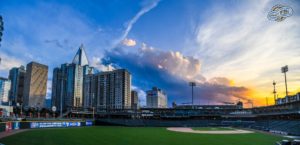On June 30, Major League Baseball (MLB) announced that 160 minor league affiliates, and tens of thousands of workers and players would not be taking the diamond or clocking in at the ballpark. Since inception in 1901, this is the first time in MiLB history that there will not be a season.
COVID-19 is something the world has never experienced, and every day individuals are learning how to operate in these unprecedented times. Head groundskeepers at minor league stadiums (around 175 total in the United States) are dealing with budget cuts, input reductions and more, but when it comes down to it, sports field management is a year round job and grass continues to grow, meaning there is still a field to maintain.
“Our organization saw the handwriting on the wall, and it was pretty evident that there was not going to be a season,” said Keith Winter, Head Groundskeeper for the Fort Wayne TinCaps, Single-A affiliate of the San Diego Padres. “Despite the staff changes, we are still doing the same thing we’d be doing in terms of field care because the field doesn’t stop growing, and turf needs fertility along with everything else.
“You have to make changes to adjust to the current conditions, but you also need to maintain a facility.”
To view the SFMA’s ‘Route to Recovery’ guide and more resources, click here.
Saving money for the club is top of mind for the 14-year veteran, managing to reduce inputs by 60 percent. Winter has become more diligent when treating the field, timing everything more precisely with fewer inputs. However, Parkview Field isn’t experiencing the wear and tear it usually does mid-summer, making the variable of “recovery time” non-existent.
 Minor league stadiums serve multiple purposes throughout the year. Even though facilities like the TinCaps’ are not hosting MiLB games, a multitude of events pack stadium schedules year-round. From graduations, to youth sports, stadiums are being utilized for activities other than professional baseball.
Minor league stadiums serve multiple purposes throughout the year. Even though facilities like the TinCaps’ are not hosting MiLB games, a multitude of events pack stadium schedules year-round. From graduations, to youth sports, stadiums are being utilized for activities other than professional baseball.
Check out why properly laying down baseball infield skin is important, here.
Matt Parrott, Head Groundskeeper for the Charlotte Knights, the Triple-A affiliate of the Chicago White Sox, said that it has been just as busy as every other year at BB&T Ballpark. However, without a baseball season, Parrott and his staff were given the opportunity to look more into the future of their maintenance program by working on cultural practices and agronomic issues while also maintaining the surface for smaller events, such as disc golf and dance recitals.
“We are still maintaining the field at a very high level, but we are doing it by reducing inputs,” said Parrott. “The traffic we have on our field right now is completely different compared to what we have during and after the baseball season.”
When the pandemic touched down, there was a lot that was up in the air for Parrott, Winter and all other sports field managers. Some groundskeepers believed minor league baseball was going to be played, while others were convinced there was little hope for baseball.
“A lot of the early collaboration was about, ‘what are we going to do?’” said Parrott. “That led to everyone taking a breath and focusing on how we, as sports field managers, can bring value to our teams while still maintaining the core identity of the team.”
When it comes to collaboration within the industry, groundskeepers and sports field managers are connecting on a regular basis to get an understanding of what their peers are doing at their ballparks, especially since the beginning of the pandemic. As part of these efforts, both Winter and Parrott have joined the Sports Turf Manager’s Association’s series of Town Hall meetings, along with SFMA Board Director for Professional Facilities Stephen Lord, CSFM (Cincinnati Reds) and Andy Ommen (McLean County PONY Baseball) to discuss what they are seeing at each of their respective levels of baseball during the pandemic.
Other Sports Field Management Resources
Route to Recovery – Healing Through Sports Part I
Route to Recovery – Healing Through Sports Part II
Where Do I Start to Maintain My Athletic Fields Again?
An Ever-Evolving Roller Coaster for Parks and Recreation Sports Field Managers
Looking to share what you’ve experienced thus far as a sports field manager in the pandemic? Contact Nate Rubinstein at nrubinstein@buffalo.agency.